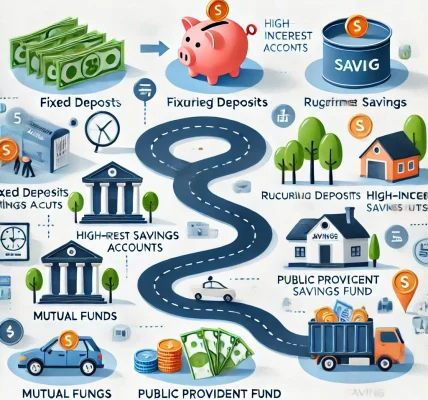Introduction
Millennials often face unique financial challenges, including student loans, rising living costs, and uncertain job markets. However, starting a smart saving plan early can lead to long-term financial security. This guide explores the best saving strategies tailored for millennials to grow their wealth efficiently.
Why Millennials Need a Smart Saving Plan
Millennials tend to delay financial planning due to immediate expenses, but saving early provides numerous advantages:
- Power of Compounding: Small savings today grow significantly over time.
- Financial Security: Helps manage emergencies without debt.
- Early Retirement Potential: Allows greater financial freedom later in life.
1. Set Clear Financial Goals
Defining short-term and long-term goals is essential:
- Short-term: Emergency fund, travel, gadgets.
- Medium-term: Buying a home, wedding expenses.
- Long-term: Retirement savings, wealth building.
Using SMART (Specific, Measurable, Achievable, Relevant, Time-bound) goals can make saving plans more effective.
2. Create and Stick to a Budget
A budget helps control expenses and allocate savings wisely. The 50/30/20 Rule is a simple method:
- 50% Needs: Rent, food, utilities.
- 30% Wants: Entertainment, dining out.
- 20% Savings: Investments, emergency fund.
3. Build an Emergency Fund
An emergency fund acts as a financial cushion during unexpected events like medical expenses or job loss. Aim to save 3-6 months’ worth of expenses in a high-yield savings account.
4. Leverage High-Interest Savings Accounts
Traditional savings accounts offer minimal returns. Instead, opt for:
- High-Yield Savings Accounts
- Money Market Accounts
- Certificates of Deposit (CDs)
5. Invest in Retirement Plans Early
Millennials should take advantage of retirement savings options:
- Employer-sponsored 401(k): Contribute at least enough to get the employer match.
- Roth IRA or Traditional IRA: Tax-advantaged growth for long-term savings.
6. Automate Savings for Consistency
Automating savings ensures regular contributions without the temptation to spend. Setting up automatic transfers from your paycheck to savings accounts makes wealth accumulation effortless.
7. Diversify Investments
Relying solely on savings accounts isn’t enough. Consider:
- Stock Market Investments: ETFs, index funds, or individual stocks.
- Real Estate: Buying property for long-term wealth building.
- Cryptocurrency (With Caution): A small allocation for high-risk, high-reward potential.
8. Minimize Debt and Manage Credit Wisely
Avoiding unnecessary debt and maintaining a good credit score are crucial. Strategies include:
- Paying credit card bills in full.
- Refinancing student loans for lower interest rates.
- Using budgeting apps to track expenses.
9. Take Advantage of Tax Benefits
Saving strategies should also include tax-efficient plans such as:
- Health Savings Accounts (HSA) for medical expenses.
- 401(k) or IRA contributions to reduce taxable income.
- 529 Plans for future education expenses.
10. Continuous Financial Education
The financial landscape evolves, so millennials should stay updated through:
- Books and Blogs: Follow personal finance experts.
- Podcasts and YouTube Channels: Listen to credible sources.
- Workshops and Online Courses: Enhance financial literacy.
Conclusion
Millennials have the advantage of time, making early financial planning crucial. By setting goals, budgeting effectively, leveraging high-yield savings, and investing wisely, they can secure their financial future. Starting today is the key to long-term wealth and financial freedom.




